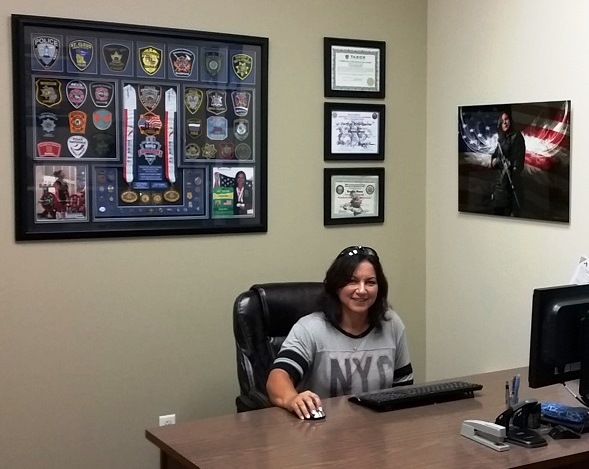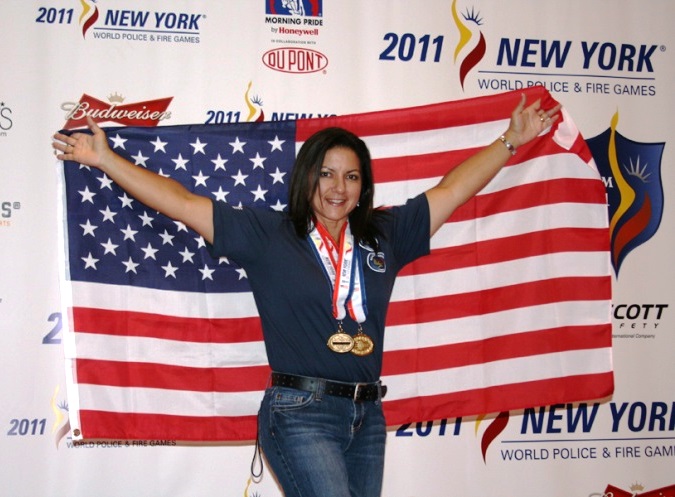For a quarter century, Special Agent Karen Mory has worked to dismantle preconceptions and stereotypes in her own life as well as those of offenders.
(See this recent video interview with Karen Mory.)
Mory began her career working with youth offenders. She moved on to parole and eventually became a special agent for the Office of Correctional Safety’s (OCS) Special Service Unit (SSU). She’s done much in the department from helping youth offenders get on the right path to helping topple gang leaders. Special Agent Mory is one of only 32 SSU agents in the entire state.
As she put it, “SSU is CDCR’s 24-hour response team that ensures safety, decreases liabilities, restores justice and resolves emergency issues to preserve the reputation and sanctity of CDCR.”

Meet Special Agent Karen Mory
“I started my 25-year career at the California Youth Authority (now the Division of Juvenile Justice) at Heman G. Stark Youth Correctional Facility in Chino in 1993 as a Youth Correctional Counselor,” she recalled.
The experience was life-changing on a professional as well as personal level.
“I met my husband there,” she laughed. “No, he was not an inmate, and we have two amazing children.”
From counselor to parole agent to SSU
For three years she was a field parole agent in San Diego and then served almost six as a Parole Agent II.
“Most of that time I was on the Gang Intelligence and Apprehension Unit covering all of San Diego County by myself,” she said. “I was cross-sworn as a Special Deputy U.S. Marshal during two years of that assignment. … In October of 2006 I got hired into my dream job as a special agent for OCS’s SSU.”
She is currently:
- Tactical Firearms Instructor
- Master Taser trainer
- Entry Operations instructor
- Confidential Informant Management instructor
- Also instructs Report Writing, Gangs and more.
“In my spare time I enjoy hiking, fishing, traveling, and many sports with my family. I previously stayed in shape with Jiu Jitsu and kickboxing, but stay on the tamer side of exercise now that I am in my 50s,” she said.
Special Agent Mory is competitive by nature


“I was a competitive power lifter from 1994 to 2011, accruing 20-plus medals in the Police Summer Games for powerlifting, bench press, arm wrestling and tug-of-war. My last and most memorable competition culminated in world records for bench press and powerlifting in the 148-pound weight class in the World Police Games held in New York City in 2011,” she said.
With the weights, exercise and training, one might expect an imposing figure but Mory said she’s just the opposite.
“If you are picturing me based on my work or hobbies, you’re probably not imaging a 5-foot 2-inch female with a big sense of humor. I believe an officer’s greatest weapons and skills are verbal judo, ethics and the ability to understand human nature,” she said.
Patience and flexibility
“Every day is different. Some days are long and endless, some are filled with excitement, and others are unpredictable. Patience, flexibility, and a strong work ethic are required to take on tasks assigned by headquarters, at a moment’s notice. This is what makes this job special and challenging at the same time. To understand the effectiveness of a female SSU special agent, you need to know what agents actually do,” Mory said.
SSU agents take on many roles
“The job duties of an SSU agent require us to wear many hats,” such as:
- investigator
- interviewer
- interrogator
- report writer
- tactical operator
- undercover operator
- good with various firearms
- case developer
- informant manager
- communicator
- crisis/hostage negotiator
- networker
- trainer/teacher
- presenter
- teammate and leader
- time manager
- testifier
- gang expert
- and willing to work at a moment’s notice, day or night.
A typical day isn’t typical
“A simple day could include working on a self-developed case targeting drug, firearm, or violent crimes committed by parolees, inmates, prison or street gang members as well as Mexican cartels.
“We conduct database searches to find leads, developing connections and evidence between suspects and crime. Then we follow up with field investigations and liaison with task forces or other law enforcement to develop larger joint cases.
“Many SSU agents are task force officers with the Federal Bureau of Investigations; Drug Enforcement Agency; Bureau of Alcohol, Tobacco, Firearms and Explosives (ATF); Department of Justice and other agencies. These could lead to endless hours of wire taps, surveillance, interviews, developing informants and managing them in the field. Sometimes this can lead to testimony in state and federal courts.”
Flexibility is key
“The prison investigators have cases they develop in which narcotics cases or violent crimes necessitate warrant service in the community or investigations and evidence collection outside the prison walls. Assisting the prison investigations units with these cases and serve the search and arrest warrants is part of the job. We are called to serve our own high risk warrants. Also, we help other agencies, the prisons, and large scale operations where multiple targets are taken down simultaneously,” she said.
Fewer than 3 dozen SSU agents in state
“We could have a day of paperwork, writing detailed reports, reviewing gang validations, writing warrants, documenting database search information and memos. Although each SSU office has a particular set of counties and prisons to service, there are only about 32 SSU agents in the state. Because of this, we frequently work together across county lines, up and down the state.
“SSU agents do not just wear many hats, we wear many clothes. An SSU agent could start their day in a suit testifying in court, then change into jeans and a t-shirt for undercover work. Then, they might throw on a BDU uniform, boots and tactical gear to serve a warrant or do firearms training. Finally, as we are headed home for the day, we get an emergency call. This requires using the emergency overnight bag we all carry. As much as we plan for potential situations, we can never plan exactly when we can go home for the day. So, we frequently eat fast food on the fly, drink our share of coffee and energy drinks, and struggle to fit personal fitness into our schedules.”
She said one of the more important tasks of SSU agents is the apprehension of escapees.
“Emergency response can be any number of tasks mandated by top brass at CDCR headquarters in Sacramento. The most important and unexpected are prison escapes and inmates that walk away from camps and correctional residential placements,” she said.
Underestimating female agents
“Having a female agent on the team makes transporting and searching female suspects/inmates more comfortable in a public setting. The likelihood of false accusations against male agents diminishes significantly. Dignitary protection of a female VIP, when they need to access gender specific facilities, is easier. Getting the door opened for a ‘knock and talk’ is successful more frequently when a female agent is sent in undercover. People on the wrong side of the law usually do not see females as a threat, so they open the door,” she said.
Female informants usually more comfortable with female agents
“When handling female confidential informants, it is preferable to have a female handler at least co-managing the female informant. Also, having a woman’s perspective and communication style seems to elicit more information from the female informants. The informant trusts the agent can see her perspective as a woman. When a female confidential informant tries to manipulate or garner sympathy from a male agent, a female agent can spot those tactics and address them immediately. When SSU develops female citizen informants during escape or fugitive cases, and they are willing to point out locations for our suspect, having a female agent is helpful. The female informant believes a woman understands their love and devotion to their family member or significant other. They do not see us as a threat, but someone who wants to help.”
Children, family members tend to look to the female agents
“During warrant service, we often find multiple generations in the home. They are shocked to find themselves out on their front lawn in pajamas in the early morning. The kids are scared, grandparents in disbelief, and there are angry parents or siblings of the suspect. When we are clear, SSU agents tend to the family’s physical needs, providing clothes and medications. I find in those moments, the family turns to me, as a female, looking for help with their emotional needs,” she said.
“I am able to calm them down, treat the elderly with care and compassion, and kids warm up to a female in BDUs a lot quicker because we do not resemble the movie character cops they see on TV manhandling suspects in a movie. This helps them understand we are there just doing our job but that we see them as people too.”
Young girls are curious about Mory’s job
“I have also seen how having a female agent in warrant service can have a positive effect on young girls in the home or in the community. They ask me a lot of questions about being a ‘girl cop’ and see that girls can do the job well without having to be 6-feet tall and built like a Mack truck. When they say, ‘You aren’t as scary as the cops in the movies,’ it is a compliment. We do not always have to be scary and overpowering to do our job effectively,” she said.
Communication is key
“Communication skills and the ability to read other people’s emotions are (our) best assets. Giving insight on a case from a mother’s, sister’s or girlfriend’s perspective to SSU teammates can be beneficial when assessing motivations,” she said. “Going through Crisis Negotiation certification with CDCR Crisis Response Team showed me the importance of verbal skills. Choosing the right words in critical situations, understanding the psychological state of the suspects and hostages, and communicating with understanding and authority brings success in negotiations.”
Outside agencies also see benefits
“In working with outside law enforcement special teams that do not have a female agent assigned to the unit, I find that they quickly see the advantages of having a qualified female team member. There have been a few teams that hired a female investigator to their unit after working with me for a period of time,” she said. “They really grasped all the subtle differences and unique skill sets that a female agent can provide to the team dynamic.”
Live up to the values of the department
“Ultimately I believe the SSU goal is to support the mission of the department with honor, uphold the law with integrity, and serve and protect society with humility,” she said. “Ideally and gratefully we come home to our families at the end of the day.”
By Don Chaddock, Inside CDCR editor
Photos courtesy Special Agent Karen Mory
Video by Cam Applegate, TV Specialist
Learn more about women working at CDCR.
See more stories highlighting CDCR/CCHCS staff.
Follow CDCR on YouTube, Facebook, X (formerly Twitter). Listen to the CDCR Unlocked podcast.
